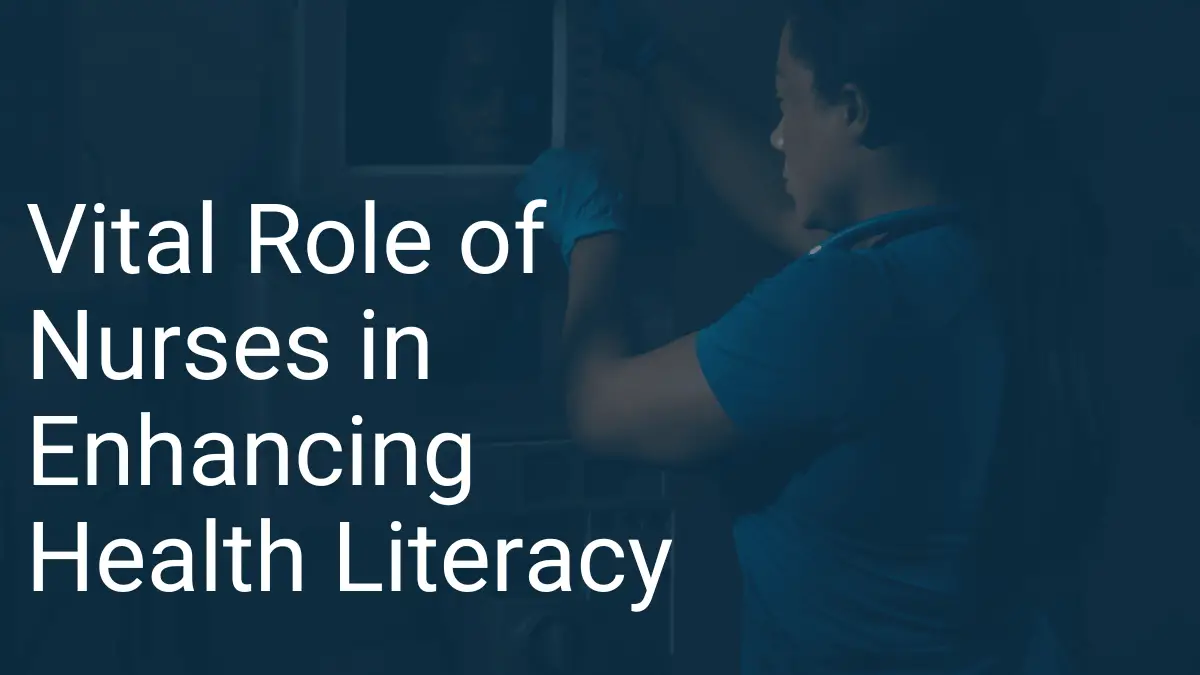In the dynamic landscape of healthcare, the significance of health literacy cannot be overstated. Health literacy, defined as the ability to obtain, understand, and act on health information, is a fundamental determinant of health outcomes. However, it’s an area where many individuals face challenges, leading to disparities in healthcare access and outcomes. In this comprehensive guide, we delve into the pivotal role nurses play in addressing health literacy, exploring their contributions, strategies, and impact on patient care and outcomes.
Understanding Health Literacy: A Primer
Before delving into the role of nurses, it’s crucial to grasp the concept of health literacy comprehensively. Health literacy encompasses a spectrum of skills, including reading, writing, numeracy, communication, and critical thinking. Individuals with limited health literacy may struggle to navigate the complexities of the healthcare system, comprehend medical instructions, or make informed decisions about their health. This underscores the importance of tailored approaches and interventions to bridge the health literacy gap.
Table: Key Health Literacy Assessment Tools
| Assessment Tool | Description | Target Population |
|---|---|---|
| Newest Vital Sign (NVS) | Brief screening tool for assessing health literacy based on ice cream nutrition label comprehension. | Adults and Adolescents |
| Rapid Estimate of Adult Literacy in Medicine (REALM) | Word recognition test to assess patients’ ability to pronounce medical terms. | Adults |
| Test of Functional Health Literacy in Adults (TOFHLA) | Comprehensive assessment tool measuring reading comprehension and numeracy skills in healthcare contexts. | Adults |
| Health Literacy Skills Instrument (HLSI) | Self-report questionnaire evaluating individuals’ perceived ability to understand and use health information. | Adults |
The Nexus of Nursing and Health Literacy
Nursing Education and Training: Nurses are uniquely positioned as frontline healthcare providers, interfacing with patients across diverse settings, including hospitals, clinics, and communities. Their education and training equip them with the knowledge and skills to communicate effectively with patients, assess their understanding, and empower them to take charge of their health. Nursing programs increasingly emphasize health literacy as a core competency, ensuring graduates are adept at addressing the needs of diverse populations.
Communication and Patient Engagement: Effective communication lies at the heart of nursing practice. Nurses employ various strategies to enhance health literacy, such as using plain language, visual aids, and teach-back techniques to ensure patients grasp essential health information. By fostering a supportive and empathetic environment, nurses encourage patients to ask questions, voice concerns, and actively participate in shared decision-making processes, thereby promoting health literacy and self-efficacy.
Health Promotion and Advocacy: Nurses serve as advocates for health promotion and disease prevention, empowering individuals and communities to adopt healthy behaviors and lifestyles. They conduct health assessments, provide tailored education, and connect patients with resources to enhance their health literacy and self-care skills. Whether through individual counseling or community outreach initiatives, nurses play a pivotal role in fostering a culture of health literacy and empowerment.
Evidence-Based Strategies and Best Practices
In their quest to promote health literacy, nurses leverage evidence-based strategies and best practices tailored to the unique needs of their patients and communities. Some effective approaches include:
- Health Literacy Assessment: Nurses conduct comprehensive assessments to identify patients with limited health literacy and tailor interventions accordingly. Screening tools, such as the Newest Vital Sign (NVS) or the Rapid Estimate of Adult Literacy in Medicine (REALM), help identify individuals at risk and guide intervention efforts.
- Plain Language Communication: Nurses communicate health information in clear, concise language, avoiding jargon and technical terms. By using everyday language and simple explanations, they enhance comprehension and empower patients to make informed decisions about their health.
- Visual Aids and Multimedia Resources: Incorporating visual aids, infographics, and multimedia resources enhances understanding and retention of health information. Nurses utilize posters, videos, and interactive tools to reinforce key concepts and teach practical skills, catering to diverse learning preferences and literacy levels.
- Teach-Back Methodology: The teach-back method involves asking patients to explain health information in their own words, providing an opportunity for clarification and reinforcement. Nurses use this technique to assess comprehension, address misconceptions, and ensure patients are equipped to follow through with treatment plans.
- Cultural Competence and Sensitivity: Recognizing the influence of culture, language, and beliefs on health behaviors, nurses strive to deliver culturally competent care. By acknowledging and respecting cultural differences, they build trust, facilitate communication, and tailor interventions to meet the unique needs of diverse populations.
The Impact of Nurse-Led Health Literacy Initiatives
Nurse-led health literacy initiatives yield tangible benefits for patients, healthcare systems, and society at large. By enhancing patients’ understanding and engagement, these initiatives contribute to improved health outcomes, reduced healthcare disparities, and enhanced patient satisfaction. Moreover, they promote cost-effective care delivery by minimizing errors, preventing hospital readmissions, and optimizing resource utilization.
Conclusion
In conclusion, nurses play a multifaceted role in addressing health literacy, serving as educators, communicators, advocates, and catalysts for change. Through their expertise, empathy, and commitment to patient-centered care, they empower individuals and communities to navigate the complexities of healthcare, make informed decisions, and achieve optimal health outcomes. As we strive for equitable, patient-centered healthcare systems, nurses remain indispensable allies in the journey towards health literacy and empowerment.


